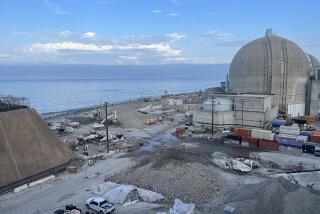Iraq OKs U.N. Plan to Destroy Nuclear Plant
BAGHDAD, Iraq — Saddam Hussein’s government backed down Tuesday and agreed to let the United Nations destroy nuclear arms production facilities at the Al Atheer complex, reducing the chances of Iraq rebuilding its nuclear program undetected.
After months of wrangling, the government’s position was conveyed to Dimitri Perricos of the International Atomic Energy Agency shortly after his 26-member team arrived in Baghdad, an aide to Perricos said.
The aide, speaking on condition of anonymity, said from Baghdad: “They agreed to destroy what the IAEA says should be destroyed.”
The IAEA, the U.N.’s nuclear watchdog agency, decided last month to demolish about a dozen buildings at the Al Atheer research complex southwest of Baghdad.
The mission was considered the first real test of Iraq’s promise to the Security Council last month that it would comply with the terms of the Gulf War cease-fire.
Baghdad’s efforts to evade the sanctions had sparked threats of military strikes by Security Council member nations that sent coalition forces to Kuwait last year.
Reports from Washington indicate that the Bush Administration was off target in its claims that allied bombing practically eliminated Iraq’s nuclear capability during the Gulf War. Al Atheer escaped the war almost unscathed.
Before leaving Bahrain, regional headquarters of the U.N. Special Commission probing Iraq’s arsenals, Perricos said the buildings to be destroyed were “the technical core of Al Atheer.”
“We’re pretty convinced that this is the area where the nuclear weaponization development and eventual production” was to take place, he said in an interview.
The Greek nuclear expert said that the demolition at Al Atheer was only the beginning of a process intended to ensure that Iraq cannot revive its pursuit of building a nuclear bomb.
Perricos said the team will be working for eight days.
More to Read
Sign up for Essential California
The most important California stories and recommendations in your inbox every morning.
You may occasionally receive promotional content from the Los Angeles Times.









